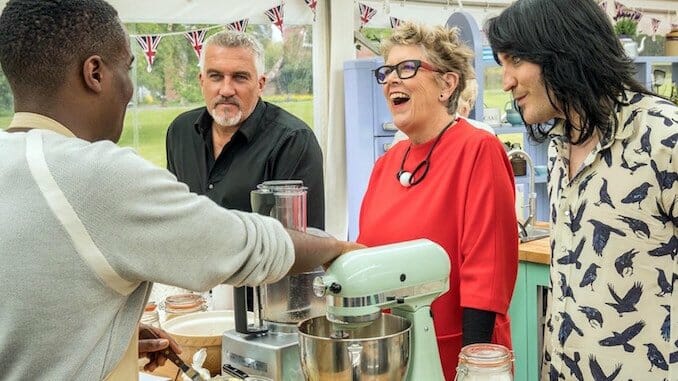How The Great British Baking Show Restores the Dignity of Competition
Photo Courtesy of ITV
In my head, I can’t stop comparing Paul Hollywood to Simon Cowell. It started simple, with thoughts like “Paul Hollywood is Simon Cowell if he wasn’t a prick.” But I knew that was insufficient; Cowell being a prick is more than just a personality quirk, and Hollywood being kinder even in his moments of sharp-edged critique is more than just a choice. It stems from what they do. Cowell’s aim in life is to make money from the artistic ability of others. He happens to be very good at it, and hence his worldview is one where artists or people trying to be artists are commodities. Hollywood, on the other hand, started as a baker, worked as a baker for many years, and despite whatever swagger or arrogance he carries with him, there’s a love of it instilled at the fundamental level. He appreciates craft more than someone like Cowell would, since Cowell never practiced craft in a serious way and only sees music as a means to a financial end. When Hollywood sees amateurs who are in love with baking, there’s a flicker of sympathy even for the desperate cases, while Cowell would only see a hopeless aspiring musician as a failed commodity—someone who is quite literally worthless to him—and hence someone who can be be dismissed or even mocked.
This, I think, gets to the heart of why I love The Great British Bake Off (known on American Netflix as The Great British Baking Show). Unlike most reality competitions involving amateur passions, there is an understanding here of the risk that these normal people take on when they join the show, and the incredible vulnerability of their big moment. Every person who signs on for a show like this understands that he or she could be humiliated before a massive audience—the most public any of these private people will ever be, by a massive order of magnitude—and those with a sense of imagination also likely understand that, should it go wrong, it could permanently spoil one of the things they love the most in the world. There’s really nothing that can be done to mitigate that risk and vulnerability, which makes it surprising that so many shows adopt the Cowell model and go the next step in treating those who fail as objects of ridicule.
GBBO does not do this. Even the hardest personalities, like Hollywood, strive to soften the blow, and while that may seem like the bare minimum to meet a standard of basic human decency, it’s actually abnormal in the world of competitive television and a big reason for the show’s runaway success. Rather than coming off as soft, the general atmosphere of kindness actually heightens the intensity, because it reveals the humanity in every baker and makes you care that much more. This show’s creators, its judges, and its hosts understand that the spectacle of a human loving something very much and risking disaster to reach a goal is about the most dramatic thing you can imagine, and the way to squeeze real emotion from this situation is not by emphasizing the risks or spotlighting a cruel critic or running weepy mini-bios; you heighten the drama by heightening the humanity.
How simple is that? How elegant?
-

-

-

-

-

-

-

-

-

-

-

-

-

-

-

-

-

-

-

-

-

-

-

-

-

-

-

-

-

-

-

-

-

-

-

-

-

-

-

-








































